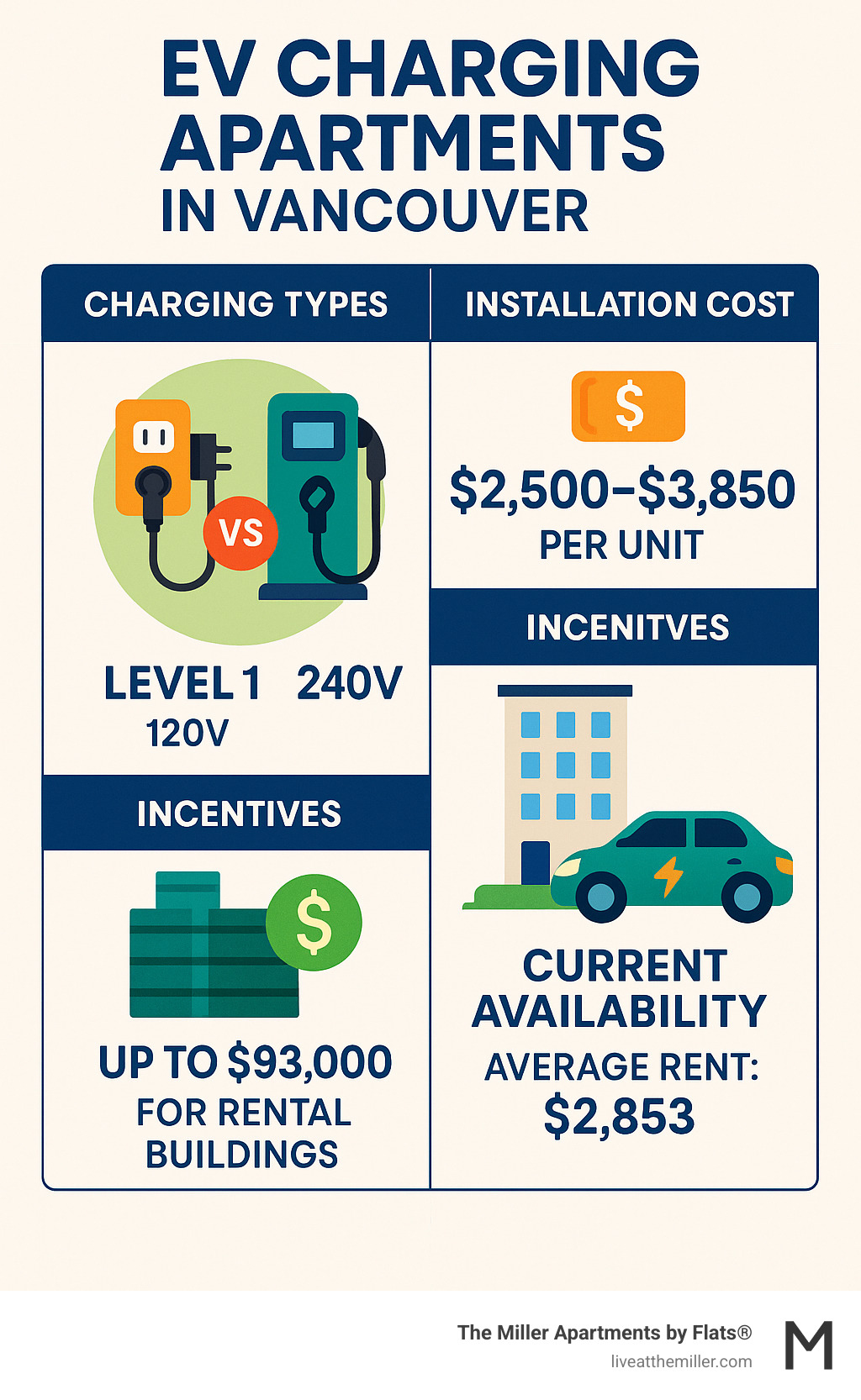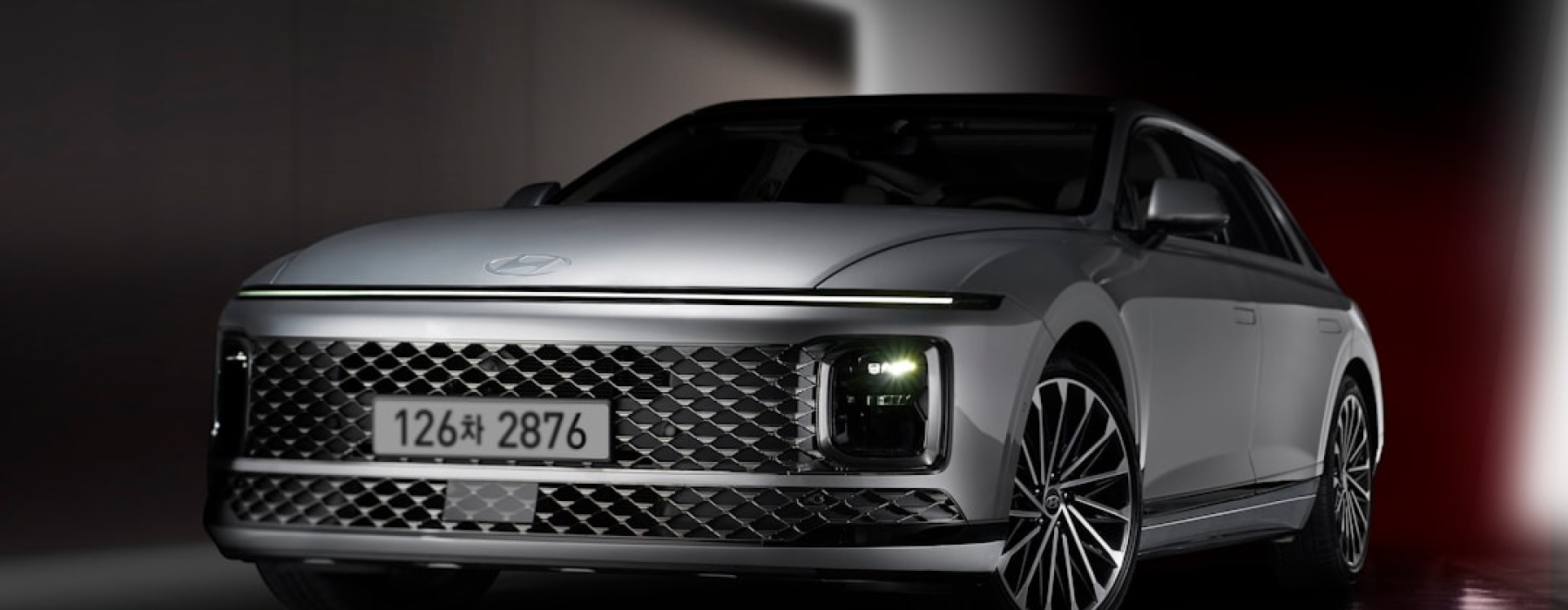Powering Up Your Vancouver Apartment Life with EV Charging
Vancouver, Washington's skyline isn't the only thing evolving these days. The quiet revolution of electric vehicles is changing how residents think about their homes and daily commutes. EV charging apartments Vancouver are quickly becoming the new must-have amenity for forward-thinking renters.
The numbers tell an interesting story. Across Vancouver, apartment buildings offering EV charging capabilities command an average rent of around C$2,853, reflecting the premium value of this increasingly essential feature. Most buildings provide Level 2 chargers (240V), giving you a much faster charge than standard household outlets – perfect for busy urbanites who need their vehicles ready to go.
What's fascinating is how this trend spans both architectural generations. Brand-new glass towers are being built with charging infrastructure from the ground up, while charming older buildings are getting thoughtful retrofits to accommodate the electric revolution. It's Vancouver's practical response to changing times.
Looking ahead, the future seems even brighter. Major developments like Oakridge Park have ambitious plans to include 500 Level 2 charging stations serving 3,000 residences – a ratio that shows developers are taking EV adoption seriously.
"People spend the money because they believe it's the future," shares Tim Lau, a Vancouver strata council member who championed EV charging implementation in his building. His sentiment captures the practical optimism driving this change.
For apartment hunters, the presence of reliable charging infrastructure is increasingly becoming non-negotiable. As one property manager candidly observed: "A property may have everything else going for it – beautiful views, great security, excellent amenities – but without EV charging, many prospective tenants simply move on to the next option."
This reality hits home when you consider that over 70% of Metro Vancouver residents live in multi-unit buildings. The region's electric transportation future depends heavily on creating accessible charging solutions for apartment and townhome dwellers.
Washington's abundant hydroelectric power creates the perfect foundation for this shift. Combined with state climate initiatives and zero-emission mandates, Vancouver is naturally positioned to lead in electric vehicle adoption – and the apartment market is responding accordingly.
Whether you're actively searching for an EV charging apartments Vancouver option or simply planning ahead for your next vehicle purchase, understanding this evolving landscape is your first step toward a more convenient, sustainable living situation.

Why EV Charging Matters for Vancouver Renters
Vancouver, Washington's electric vehicle scene is booming, with EVs now making up about 10% of all vehicle sales across the state. This impressive growth is just the beginning – with federal requirements mandating all new passenger vehicles and light-duty trucks sold in the United States be zero-emission by 2035, we're witnessing the early stages of a transportation revolution.
Vancouver has a special advantage in this transition thanks to Washington's remarkably clean electricity. With a significant portion of Washington's power coming from hydroelectric sources, plugging in your EV here means genuinely green transportation. When you charge in Vancouver, you're not just switching fuel types – you're making a legitimate environmental choice.
"Access to home charging is considered a key enabler for electric vehicle uptake," explains a Washington State Department of Transportation report, highlighting why EV charging apartments Vancouver are so crucial to meeting climate goals and supporting residents who want to make the switch.
Environmental & Wallet Benefits
The green benefits of driving electric in Vancouver are substantial and real. Thanks to Washington's clean hydroelectric grid, switching to an EV can slash your transportation greenhouse gas emissions by up to 97% compared to conventional vehicles. Over your car's lifetime, this represents tons of carbon dioxide kept out of our atmosphere.
Your wallet will thank you too. Most EV drivers save between 50-75% on "fuel" costs compared to gasoline vehicles. Picture this: charging at home in Vancouver typically costs $30-40 monthly for average driving, while gas might run $150-200 for the same distance.
The savings don't stop there. EVs have fewer moving parts than traditional cars, meaning lower maintenance costs over time. No more oil changes, fewer brake replacements (thanks to regenerative braking), and simpler powertrains translate to fewer mechanic visits and more money staying in your pocket.
Home-Charging vs Public Network
While Vancouver has built an impressive public charging network in recent years, home charging remains the gold standard for convenience and affordability. Industry data shows about 85% of EV charging in the United States happens at home or work – and for good reason.
Home charging offers unbeatable benefits: the convenience of overnight charging while you sleep, lower electricity rates during off-peak hours, no waiting at public stations, protection from Vancouver's famous rain while charging, and guaranteed availability whenever you need it.
For apartment dwellers without dedicated charging, however, the situation gets trickier. Tenants in older buildings face significant problems, including lack of dedicated parking with electrical access, higher costs at public charging stations, the inconvenience of finding (and often waiting for) public chargers, and limited say in charging infrastructure decisions.
This disparity has raised important equity concerns. A Clark County report noted that "tenants are being short-changed by current incentives favoring single-family homeowners." Recognizing this gap, the city has developed targeted programs to increase EV charging apartments Vancouver availability – something we'll explore in detail in upcoming sections.
As more Vancouver residents accept electric vehicles, having convenient charging at home is quickly shifting from luxury to necessity – making apartments with built-in EV charging increasingly valuable in the rental market.
EV charging apartments Vancouver: Availability, Rents & Future Supply
The market for EV charging apartments Vancouver is booming as property managers catch on to what residents increasingly want. Across Vancouver, Washington, dozens of forward-thinking apartment buildings now offer EV charging capabilities, with new properties joining the movement every month.
Average rent in EV charging apartments Vancouver
Finding an apartment with EV charging in Vancouver typically comes with a price tag reflecting the premium nature of this amenity. Current market data shows apartments with EV charging facilities average around C$2,853 monthly. Budget-conscious renters can find more affordable options starting near C$2,600, like those available at Metropolitan Towers.
Space-seekers will find the largest EV-ready apartments hover around 708 square feet, with Waterfront area properties offering units starting from C$2,600. These figures aren't surprising when you consider that buildings with charging stations tend to be newer constructions or recently renovated properties bundling EV charging with other modern amenities.
"We see providing this amenity — or actually, this necessary infrastructure — as a competitive advantage for our rental units," explains Michael Hack, Project Planning Manager at a leading property management company. "If people are going to own these vehicles, they will look for somewhere to call home that has this offering."
Some clever property managers have turned EV charging into a powerful marketing tool. As Chris Thompson, Director of Marketing at a Vancouver property firm, shares: "Having EV charging at our properties stands out. Our decision to offer free charging to the general public has been a marketing tool that fills more units — when people visit to use our charging stations, they also see the quality of our properties."
Pipeline Projects & Market Trends
The future looks bright for EV charging apartments Vancouver, with major developments making bold commitments to electric vehicle infrastructure:
Waterfront Vancouver is setting a new standard with its ambitious mixed-use project. The development will feature numerous Level 2 charging stations serving its planned homes—a ratio that acknowledges the rapidly growing EV market.
"The project demands a smart, space-saving charging setup that maximizes efficiency while maintaining seamless accessibility," explains David Bibby, CEO of Hypercharge, a company behind many charging solutions in the region.
The development showcases innovative approaches to high-density EV charging with both traditional and overhead solutions:
This comprehensive approach to EV infrastructure reflects where the market is heading. With electric vehicles already representing 10% of Washington's vehicle sales and state targets aiming for 20% by 2030, developers are wisely planning for tomorrow's demands.
"Waterfront Vancouver is committed to being a dynamic urban hub where sustainability and innovation meet convenience," emphasizes Chrystal Burns, Executive Vice President at a major development company in the region.
At The Miller Apartments by Flats®, residents enjoy convenient EV charging stations as part of a thoughtfully designed amenities package. Located in Vancouver's vibrant Waterfront neighborhood, The Miller blends sustainability with luxury living, recognizing that today's residents want both environmental responsibility and modern convenience under one roof.
Installing and Funding Chargers in Multi-Unit Buildings
Getting EV chargers into existing apartment buildings isn't always straightforward, but thanks to new technology and generous financial support, it's becoming much more doable. Whether you're managing a property, serving on a strata council, or just a tenant who wants to charge at home, understanding how to steer the process is key.
Incentives & Grants Cheat-Sheet
Vancouver, Washington residents are fortunate to have access to some of the most generous EV charging incentives in the country. These programs can dramatically reduce installation costs:
For rental buildings, the City of Vancouver and Clark County offer substantial incentives for charging infrastructure, with building owners only needing to contribute a small portion of the total cost. To qualify, buildings must meet certain criteria, and owners must agree to specific terms regarding the charging infrastructure.
Condominium buildings aren't left out either. Washington utilities provide rebates for EV charging installations, while state programs offer funding specifically for infrastructure improvements. For larger projects, the Department of Energy's Zero-Emission Vehicle Infrastructure Program can cover up to half of your construction costs.
Both building types can also take advantage of utility incentives for energy management systems and potential federal tax benefits for certain commercial installations.
Robert Gutierrez, who successfully led an EV charging project in his building, shared a valuable insight: "If we had gone to a 30-amp circuit to each parking spot, under the 2012 electrical code, I think we only would have supported 12 or 13 cars. But under the 2018 electrical code, we can get to 85 cars." His experience shows how proper planning and technical knowledge can dramatically improve what's possible.
Typical Costs & ROI
The cost of adding EV charging to apartment buildings varies depending on your approach:
For individual installations where each owner gets their own charger, expect to pay about $2,500–$3,850 per Level 2 charger after incentives. This works well in buildings with assigned parking spots and individual electrical meters.
Shared charging models can be more cost-effective for some buildings. One Vancouver property installed shared dual-port chargers at a cost of $27,000 for four charging spots (after receiving utility incentives), plus $3,500 for signage, bollards, and paint. They implemented usage fees ($2/hour for the first three hours, $5/hour after that) to help recover costs over time.
Some buildings have found success with subscriber models. A 120-unit downtown Vancouver property pre-wired all parking levels and sold 10 forward-looking spots to interested residents at $3,850 each. A monthly $20 admin fee plus electricity usage covers ongoing expenses.
When calculating return on investment, consider not just direct revenue but also:
- Increased property values (EV-ready units typically sell for more)
- Better resident attraction and retention
- Future-proofing against upcoming regulations
Step-by-Step Installation Roadmap
If you're ready to bring EV charging apartments Vancouver to life, follow these steps:
First, get proper permission from your building management or homeowners association. Then hire a qualified electrician, preferably one certified through the Electric Vehicle Infrastructure Training Program (EVITP), who understands the unique challenges of multi-unit buildings.
With professional help, identify suitable parking spots for charger installation and check your building's electrical capacity by requesting 12-month meter data and conducting a professional load calculation. You'll also need to review and possibly update building rules to govern EV charging use.
Draft clear user agreements covering billing, access, and maintenance responsibilities, then select rebate-eligible, networked Level 2 chargers that fit your needs. Before purchasing equipment, apply for pre-approval of available incentives.
Once approved, complete the installation with proper permits and inspections, then gather all documentation and submit for final rebate processing.
Clay Howey, Research Head at a regional technical institute, emphasizes a critical point: "The electrical infrastructure in the vast majority of multi-unit buildings were never designed to accommodate EV charging." This is why professional assessment is so crucial before proceeding.
For buildings with limited electrical capacity, an Electric Vehicle Energy Management System (EVEMS) can work wonders by intelligently sharing available power among multiple chargers. This smart approach can dramatically increase the number of vehicles that can charge simultaneously without expensive electrical upgrades.
At The Miller Apartments, we understand the importance of convenient EV charging as part of a complete modern lifestyle. Our thoughtfully designed charging infrastructure reflects our commitment to sustainability while ensuring residents have access to the amenities that matter most in today's world.
For more detailed information about installation steps, visit the Washington State Department of Commerce EV Charging Guide.
Strata Rules, Legal Decisions & Tenant Rights
Navigating homeowner association regulations for EV charging apartments Vancouver can feel like solving a puzzle. The good news? Recent legal decisions have started to create clearer guidelines for both residents and building managers.
Key Precedents Every Resident Should Know
The Civil Resolution Tribunal in Washington has handed down several decisions that shape how EV charging works in multi-unit buildings. These real-world cases offer valuable lessons for anyone considering an EV purchase while living in a condominium property.
Remember the "Common Area Outlet Case" from 2022? This eye-opening decision involved a Vancouver resident who plugged his hybrid vehicle into a common property electrical outlet. The tribunal ruled against the owner, establishing that associations have no obligation to make common property outlets available for EV charging. This means building management can create and enforce bylaws restricting outlet use for vehicle charging – a crucial detail many EV owners find too late.
Another telling case involved what locals now call "The Luxury Tower Unplugging." In this 2021 dispute, a downtown Vancouver luxury building unplugged an owner's EV charger over an unpaid installation fee. The tribunal sided with the association, with the judge noting that "a carbon copy cheque is not proof of payment." This decision reinforced associations' authority to disconnect charging service when fees remain unpaid.
These cases highlight why proper procedures matter so much. Following official channels for installation, keeping detailed payment records, and understanding that common property outlets aren't automatically available for charging can save you significant headaches down the road.
Navigating Strata Approval for EV charging apartments Vancouver
Getting the green light for EV charging in your building requires understanding how homeowner association governance works. Most associations need a 75% vote at a general meeting to approve significant common property alterations. Forward-thinking buildings have already established EV-specific bylaws, while individual installations typically need council approval through an Alteration Agreement.
When it comes to who pays for what, "user pays" models have become the gold standard. This approach ensures non-EV owners don't end up subsidizing their neighbors' charging infrastructure. While common electrical upgrades might benefit the entire building, individual connection costs typically fall to participating owners.
Bruce Campbell, who successfully implemented EV charging as a Council President, observed: "The EV chargers are immensely beneficial to the resale values of multi-unit residential buildings – attracting new owners and also the option for current owners to purchase electric vehicles."
One particularly clever approach came from a Vancouver condominium that gathered three competitive bids, secured seven paying subscribers, and built a cost-neutral system for non-owners. Their experience shows how thoughtful planning can address common concerns about fairness and expense distribution.
Clear user agreements prove essential for smooth operation, covering everything from billing mechanisms and charging time limits to maintenance responsibilities and liability provisions. These written agreements prevent misunderstandings before they occur and provide a framework for resolving conflicts when they arise.
At The Miller Apartments, residents enjoy a carefully designed EV charging program that incorporates these lessons, providing reliable access without the typical homeowner association complications found in many EV charging apartments Vancouver.
How to Pick the Perfect EV-Friendly Apartment
When hunting for EV charging apartments Vancouver, you'll quickly find that not all charging setups are created equal. The difference between a frustrating experience and a seamless one often comes down to the details you might not think to check during your initial apartment tour.
"I wish I'd asked more questions before signing my lease," shares Mira Chen, a Vancouver EV driver who moved into a building advertising charging stations only to find a lengthy waiting list for access. "Now I'm using public chargers three times a week while I wait for a spot to open up."
Checklist Before You Sign
Before you commit to that lease, take a moment to evaluate the charging situation thoroughly. Start by checking the ratio of chargers to residents – a building with 100 units but only two charging stations might leave you constantly hunting for an available spot.
The physical location of the chargers matters too. Are they conveniently located near elevator access, or will you need to trek across a sprawling garage? At The Miller Apartments, chargers are thoughtfully positioned within a secured garage parking area, making the charging experience both safe and convenient.
Smart charging capabilities can make or break your experience. Buildings using modern load management systems can serve more vehicles with existing electrical capacity, reducing wait times and frustration. Ask about the network connectivity – can you check charger availability from your phone before heading down to the garage?
Don't forget to inquire about costs beyond your rent. Some buildings include charging in your parking fee, while others charge separately per kilowatt-hour. Understanding the full cost structure helps avoid surprises on your monthly statement.
Finally, consider the future-proofing aspect. With EV adoption accelerating, how will the building accommodate growing demand? Forward-thinking properties have expansion plans already mapped out, ensuring you won't be left without charging options as more residents switch to electric vehicles.
Must-Ask Questions for EV Drivers
Walking into your apartment tour armed with the right questions can save headaches down the road. Beyond the basic "Do you have charging?" inquiry, dig deeper with these essential questions:
What are the exact charging rates you'll pay? Some buildings offer competitive rates comparable to home charging, while others mark up significantly. Understanding this cost helps you budget accurately for your transportation expenses.
How does the building handle peak charging times? Some properties implement reservation systems or time limits during high-demand periods. Knowing this policy helps you plan your charging routine accordingly.
Who's responsible when something goes wrong? Clear understanding of maintenance responsibilities ensures you won't be left with a non-functional charger for weeks while management debates who should fix it.
Is there currently a waiting list for access? In buildings with limited charging infrastructure, you might need to wait months for availability – crucial information before you move in.
Ask to see the charging equipment in action during your tour. This gives you a chance to assess not just whether it exists, but if it's well-maintained and user-friendly.
The charging network matters too. Some networks have better reliability records than others, and compatibility with your preferred charging apps can make your daily routine smoother.
"The technology behind the charging matters as much as the presence of chargers," explains Kelly Carmichael, an EV infrastructure specialist. "Open-standard approaches ensure flexibility and future compatibility as technology evolves."
At The Miller Apartments, residents enjoy access to reliable charging stations as part of a comprehensive amenities package that emphasizes both sustainability and modern convenience. The thoughtful integration of EV infrastructure reflects The Miller's commitment to forward-thinking urban living, where practical needs meet luxury comfort.
Finding the right EV charging apartments Vancouver requires looking beyond the simple "yes, we have chargers" to evaluate the complete charging experience. With these guidelines in hand, you'll be well-equipped to find an apartment where plugging in is a pleasure, not a pain.
Frequently Asked Questions about EV charging apartments Vancouver
Is installing my own charger allowed in EV charging apartments Vancouver?
Installing your own EV charger isn't as simple as plugging in a new appliance—it depends on your specific living situation and building policies.
If you're renting, you'll need your landlord's permission first. While Vancouver encourages landlords to be accommodating to these requests, they aren't legally required to approve them. The conversation typically goes more smoothly when you come prepared with information about installation requirements and potential incentives.
For condominium building owners, you'll need to get formal approval through an Alteration Agreement with your homeowners association. This usually means submitting professional plans from a certified electrician that demonstrate the installation will meet all safety standards and building requirements.
Any installation must comply with the National Electrical Code, which often means permits from the city and inspections by safety authorities. And as one tribunal member made clear in a recent case: "There is no obligation for a homeowners association to make any common property electrical outlets available for owners to use." In other words, you can't just start using an existing outlet without proper permission.
What incentives can landlords access to add EV chargers?
Vancouver, Washington property owners have access to some truly impressive incentives that make adding EV charging infrastructure surprisingly affordable:
The City of Vancouver and Clark County offer substantial incentives for EV charging infrastructure in rental buildings. Building owners typically need to contribute just a portion of the total cost—making this an exceptional opportunity for landlords looking to upgrade their properties.
Beyond the local programs, Washington utilities provide rebates for equipment and installation costs, while state programs offer funding specifically for electrical infrastructure upgrades. At the federal level, the ZEVIP program can cover up to half of installation costs for multi-unit residential buildings.
Accessing these incentives typically follows a straightforward process: apply for pre-approval before buying anything, hire qualified contractors, install eligible networked charging equipment, and submit your documentation after completion.
These generous programs have transformed the landscape of EV charging apartments Vancouver, making it financially viable for many buildings to add this increasingly essential amenity.
Do EV charging amenities raise my monthly rent?
When it comes to rent impacts, the answer has some nuance:
For new leases, apartments with EV charging facilities typically do command higher rents—but that's usually because these buildings offer a complete package of premium amenities. The average rent for EV charging apartments Vancouver runs around C$2,853, which reflects their generally newer or recently upgraded status rather than just the charging capability.
If you're already living in a building that adds charging infrastructure, there's good news. Many local EV charging programs specifically require building owners to agree not to increase rental rates as a direct result of installing the charging stations.
Most buildings handle the actual costs of EV charging through a separate fee structure—either a flat monthly fee or a pay-per-use model based on your electricity consumption. This approach ensures that those who use the chargers are the ones paying for the electricity.
As Michael Hack, a project planning manager, explains: "We see providing this amenity as a competitive advantage for our rental units." Property managers view EV charging as an investment that attracts and retains quality tenants, making their buildings more desirable in an increasingly competitive market.
At The Miller Apartments, EV charging is thoughtfully integrated into a comprehensive amenity package designed to improve residents' daily living experience while supporting sustainable lifestyle choices.
Conclusion
The landscape for EV charging apartments Vancouver is rapidly evolving as the city accepts a more sustainable future. With a significant percentage of Vancouver, Washington residents living in multi-unit buildings, convenient home charging access has become essential for widespread electric vehicle adoption.
Vancouver's apartment scene is witnessing impressive developments setting new standards with their planned charging infrastructure. At the same time, innovative retrofitting solutions are making it possible for older buildings to join the EV revolution without breaking the bank.
For many prospective residents, EV charging has shifted from a nice-to-have perk to a must-have amenity. As one property manager aptly compared it to pet policies: "For the increasing number of people who drive EVs, if a property doesn't offer EV charging, it may not be worth the hassle."
The Miller Apartments by Flats® exemplifies this forward-thinking approach in Vancouver's vibrant Waterfront neighborhood. By integrating EV charging stations alongside premium amenities like a day spa, fitness center, and coworking lounge, The Miller demonstrates how today's luxury apartments can meet the needs of environmentally conscious residents without sacrificing comfort or convenience.
Whether you already drive an electric vehicle or plan to make the switch in the coming years, choosing an apartment with reliable charging infrastructure is a smart move. You'll enjoy daily convenience and potentially significant cost savings over time. As federal mandates push toward 100% zero-emission vehicle sales by 2035, the value of this amenity will only increase with each passing year.
The future of urban living in Vancouver is undeniably electric, and apartments with robust charging solutions are leading the charge toward a greener tomorrow. Buildings that invest in this infrastructure today aren't just meeting current demands – they're positioning themselves at the forefront of a major shift in how we think about transportation and sustainable urban living.










